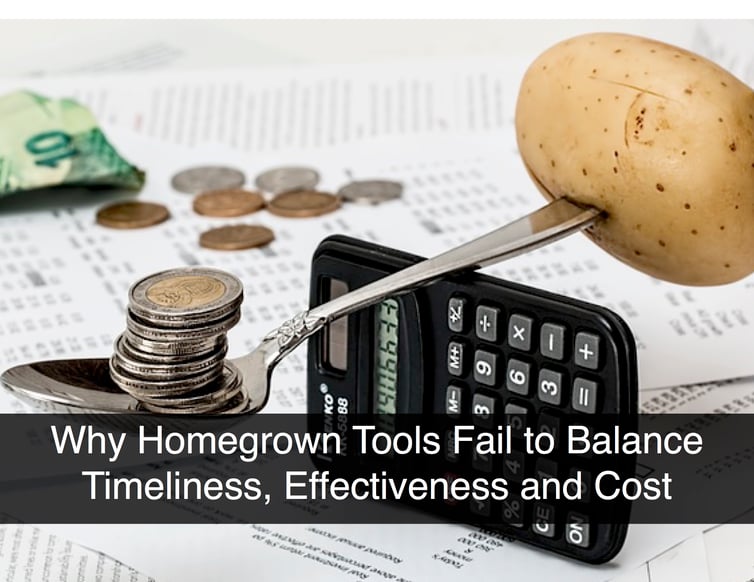
When it comes to deploying value selling tools that successfully increase sales, there are three metrics that must be addressed: timeliness, effectiveness, and cost. Any project manager knows that when it comes to timeliness, effectiveness, and cost, you can only control two of the three.
Compromising on any of these metrics and yielding variable results is unacceptable to most organizations. For this reason, it is best to partner with a vendor that delivers a platform that is configured to your solution rather than to leverage an internal development process to create your own homegrown tools. Buying purpose-built value based selling tools, developed by experts, is a proven way to manage cost, increase the effectiveness of your tools, and adhere to a schedule that puts them in your hand faster and more efficiently.
Let’s illustrate the balance between timeliness, effectiveness, and cost with this consumer scenario.
A Tale of Two Televisions
Your family decides it needs better capabilities for streaming and consuming visual entertainment. So you research the latest big screen technology and find a product with the features you want (effectiveness) at a competitive price (cost). You have easily satisfied two of the three criteria. How then do you satisfy “timeliness,” which equates to how long it takes to begin enjoying family movie night?
The first challenge is getting the television home. You could slide it into your trunk or hatchback and potentially damage it in transit. Or you could arrange to borrow a larger vehicle to minimize the risk. Once it’s in your home, you can spend time reading the manual and wading through hookups, logins, and whatever else it takes to make it operational. If you don’t succeed, you could call a tech-savvy friend for help. Or, you could spend the money up front for professional delivery and installation at a predetermined date and time.
Which approach to satisfying “timeliness” offers you greater customer value? Although the do-it-yourself approach appears to save money, it can delay enjoyment of the television, take valuable time away from doing other things, and cast doubt on the effectiveness of the installation. It may also end up costing more money if you damage the television or end up calling a professional to finish (or even fix) the job.
In this scenario and when building value selling tools, it is both practical and expedient to engage professionals who do this work every day. Their insights and experience cannot easily be duplicated, and all variables are greatly reduced. Although the initial cost may be higher, external development is ultimately more cost effective because it provides greater value realization, faster. Here’s how.
1. Timeliness: There’s No Need to Compromise
It’s hard to anticipate the organization-wide impact of developing tools in-house. Many projects contend with competing IT priorities and a mindset that says value selling tools are non-critical. Sales and marketing would disagree, but they are often powerless to upend organizational priorities. And while the hidden cost of these delays can’t be measured in dollars and cents, the cost is real in terms of lower sales productivity.
There is no need to compromise schedule when you work with an outside vendor. By mutual agreement, the development schedule is fixed, and you can count on benefitting from more comprehensive tools in less time. Is it worth the extra cost? We think so, but only you can say.
2. Effectiveness: It’s Never Negotiable
The effectiveness of your value selling tools can be measured by their impact on sales performance, and that’s not something you want to mess with. Ever. Developing purpose-built value based selling tools requires specialized expertise, industry insights and analytics, a dedicated development platform, and the experience that comes from creating solutions for companies across multiple industries. It also requires an in-depth understanding of the sales process, and the ability to create a full complement of tools that accurately convey the business value of your solution to accelerate sales decisions every step of the way.
Despite best intentions and efforts, the effectiveness of internally developed tools is variable. This can manifest as a tool that’s too complex to use or too simple to be believable. Whether it’s limited insight into their creation or project oversight as a one-off, custom task, it’s best to buy tools based on what's already worked for others and that can be tailored for your business if you’re not willing to sacrifice effectiveness.
3. Cost: Purchase Price vs. Total Value
It’s tempting to think that the purchase price represents the true cost of developing value selling tools, especially as you evaluate proposals from outside vendors. It’s also common to believe you can manage the project at a lower cost on your own. Before you move forward, we encourage you to look for hidden costs (maintenance, updates, delays, etc.), build them into your analysis, and be honest about the value you’re receiving for the dollars spent.
Variability is one of those hidden costs. Let’s say IT estimates the project will cost $10K, and a vendor quotes $20K. Simple math says do it in-house but because scheduling and effectiveness will suffer, it’s likely that the true cost of the project will exceed $10K, especially when you factor in ongoing maintenance. If you believe it’s important to control all three metrics, the decision to build or buy is easy. Go with the vendor that offers the greatest expertise and business value for your money.
Conclusion
Timeliness, effectiveness, cost. As you decide whether to build or buy your value selling tools, consider the reality that professionally-developed tools balance and control these metrics most effectively. Your tools are too important to compromise and in the long run, working with an experienced vendor will provide immediate benefits that will enhance your sales process.
About ROI Selling Tools
ROI Selling tools help you generate leads, move buyers through the pipeline, and close more deals. Use this TCO calculator to evaluate the business case for a homegrown tool vs. an ROI Selling tool.









